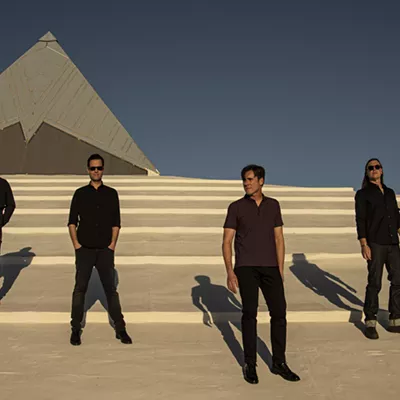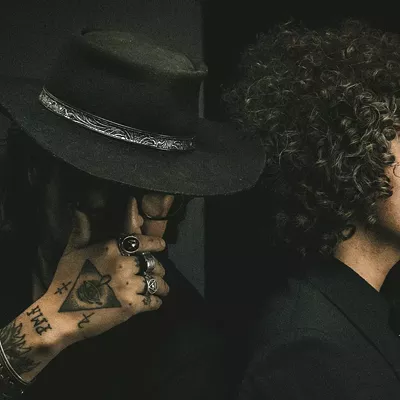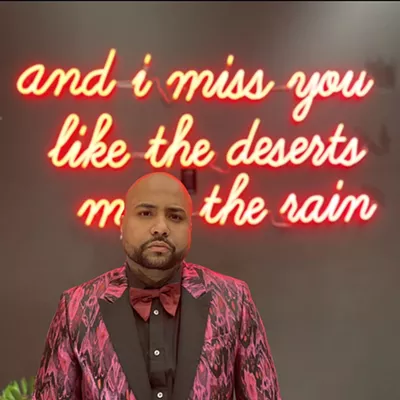That's Brian Wilson talking in a recent issue of Mojo magazine about The Beach Boys' classic 1966 album Pet Sounds, but it could just as easily be Lindsey Buckingham talking about Fleetwood Mac's 1979 album Tusk. Both albums were hugely experimental creative risks released at a time when each band was at its commercial peak. And, although Tusk managed to go multiplatinum, by the yardstick set by its predecessor, 1977's Rumours, it was deemed a commercial failure.
While Buckingham had produced the bulk of Rumours, it was with Tusk that Buckingham became to Fleetwood Mac what Wilson was to The Beach Boys: the group's creative spearhead.
Fleetwood Mac began in London in the late '60s as a British blues-rock vehicle for guitarists Peter Green and Jeremy Spencer, before releasing several albums with various transitory lineups that edged ever closer to a more pop-rock sound. By 1974, the remaining founding members--drummer Mick Fleetwood and bassist John McVie, plus his wife, keyboardist/singer/songwriter Christine McVie (who had joined after the band's first album)--had moved to California to start over. After hearing the 1973 album Buckingham Nicks, a Beach Boys-influenced folk-rock collaboration between then-romantic and musical partners Stevie Nicks and Lindsey Buckingham, the band invited the pair to join Fleetwood Mac. In July 1975, that lineup released its self-titled debut (the 11th Fleetwood Mac album). The album contained such classics as "Monday Morning," "Over My Head," "Rhiannon," "Say You Love Me," and "Landslide," and almost overnight rocketed the group to superstardom.
But that was nothing compared to the success of its follow-up, Rumours. Released two years later, the album was written and recorded amid rampant drug abuse and romantic strife within the band--the McVies' marriage, and Buckingham and Nicks' relationship, had fallen apart--which provided subject matter for many of the songs (not to mention the best. episode. ever. of VH-1's Behind the Music). More than half the songs, including "Go Your Own Way," "Dreams," "You Make Loving Fun" and perennial political campaign anthem "Don't Stop," became hit singles. To date, the album has sold upwards of 19 million copies, placing it on the list of the 10 best-selling albums of all time.
Which brings us back to Tusk. Buckingham began somewhat subversively tinkering with the band's now-trademark sound, veering off into sonic experiments that were influenced in part by Brian Wilson's from years earlier, as well as the new wave music of the era. When the ambitious double album was released in 1979, it was met by a largely confused audience that was expecting, as Buckingham puts it, "Rumours II." Even with two albums' worth of material to draw from, Tusk only generated two Top 10 singles--Nicks' "Sara" and Buckingham's title track, which utilized the University of Southern California marching band and became one of the most bizarre hit singles of the '70s.
Looking back on it, Buckingham says that he now considers himself "someone who has kind of walked a tightrope between being responsive to the needs of a group, and responsive to the needs of a larger selling machine. Selling is not synonymous with growth, as we all know--in fact, most of the time, it's just the opposite. The machinery will want to specify the thing that sells the most and try to run it into the ground.
"Well, the Tusk album was a line I drew in the sand in terms of, 'Well, I'm not going to do Rumors II. I don't want to be a person who paints himself into a corner artistically. And the band was into that as well--until the Tusk album didn't sell 16 million albums. So at that point, we had this meeting, and the band was saying, 'Well, Lindsey, we still want you to produce, but you can't do that anymore.'"
After touring for 18 months to support Tusk, the band took a much-needed break, during which both Nicks and Buckingham released solo albums. In 1982, Fleetwood Mac released the somewhat MOR Mirage, then embarked on a brief tour, which was followed by a hiatus and more solo albums--in Buckingham's case, 1984's Go Insane.
When the next Mac album, the critically lauded Tango in the Night, came out in 1987, Buckingham refused to tour. By August of that year, he had quit the group.
"The only area for me to really exercise the left side of the palate, to look at what I perceived as the growth side of being an artist, was to make solo albums," he says. While Fleetwood Mac soldiered on without him, eventually reverting back to revolving-door status and enjoying ever-diminishing returns, Buckingham took the next five years to write and record his 1992 album Out of the Cradle, which was a hit with critics, but sold poorly.
While recording material for his next solo album, in 1995, Buckingham called Fleetwood to see if he would contribute some drum work. Then he called John McVie to ask for some bass licks. And then he called Christine McVie to see if she was interested in doing some harmonies, and before long, the classic lineup of Fleetwood Mac found themselves back together. They performed a show on a soundstage, which was released as the live album The Dance, in 1997, and then toured again. Christine McVie left the band prior to the recording of Say You Will, which was released in 2003, debuting at No. 3 on the Billboard album chart. During the tour that followed, Buckingham began writing and recording new songs in his hotel rooms on days off.
The result was a new solo album, Under the Skin, which was released last year and has appeared on numerous year-end Top 10 lists. Unlike pretty much all of his previous work, the album features bare-bones production, with most tracks just Buckingham accompanying himself on guitar (though there's no lack of overdubbing). The emphasis is on Buckingham's remarkable skills as a finger-picking guitarist and introspective lyrics. That was, he says, by design.
"It's as much about what I didn't do. There are no drums; there's no real bass to speak of; there's no lead guitar. It just holds this line tone-wise pretty much. It just makes it a more authentic statement, in my mind, for what is going on subject matter-wise. ... I had gotten married and had three children, so there was this sense of wanting to do something more intimate."
Bucking his recent trend of taking as long as 14 years between albums, Buckingham intends to release another solo album early next year. And then?
"I don't know if Fleetwood Mac will do an album," he says, "but Fleetwood Mac is certainly going to tour."













